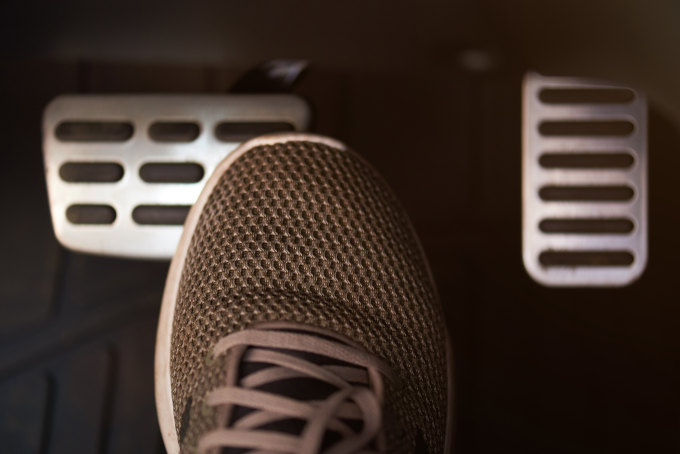Nothing puts a damper on a road trip like the tell-tale squeal of brakes. Whether you're headed out on a two-hour trip or embarking on an epic cross-country adventure, it's essential to keep your brake systems in good working order, and able to stop as quickly as possible should the need arise.
What Are Brakes?
Brakes are a vehicle's primary safety feature, as they help stop the car in emergencies and prevent collisions. Without the complex brake system, coming to a complete stop would be difficult in even the best circumstances.
How Do Brakes Work?
The brake system includes two sets of pads (one on each side of your wheels) which sit inside drums attached to the axle. When you press down on your foot pedal, hydraulic pressure forces these pads against the drum surface until it becomes hot and creates enough friction to stop your car.
Vehicle brakes are self-contained within the drum, with a series of shoes forced against the inside surface by their spring action. When there is too much brake pressure in relation to the amount of friction created between these components, it can cause your brakes to lock up--which could lead to serious vehicle damage and an accident!
How Can I Avoid Brake Failure?
Fortunately, taking the right maintenance steps can help you prevent dangerous situations. Before we break down the best brake maintenance tips, let's consider the signs that your brakes are going bad.
- Squealing
- Grinding or crunching noises when braking
- Brakes that feel 'soft' or spongy
- Braking distance that is longer than usual
- Lights indicating braking system failure on your dashboard
- ABS warning light or a low fluid level in the brake system
Keep in mind that the warning signs of brake failure are not always apparent but can include any combination of the symptoms listed above. Your best bet to avoid a costly repair bill is to have your brakes routinely checked by a professional.
What Steps Can I Take To Maintain My Brakes?
You can take various steps right now to make sure your brakes are working at their best. Let’s take a look at just a few tips on keeping your brakes healthy and strong.
1. Check your brake fluid level regularly
Just like oil, brake fluid should be changed every 40 to 50 thousand miles and flushed at least twice a year--but many experts recommend changing it once per year to avoid potential problems from minor leaks. Be sure to consult your owner’s manual for the recommended service interval specified for your vehicle.
2. Inspect your brake pads
Brake pad life varies by make and model, but inspection for wear is necessary every time you change your brakes. If the rubber is cracking or separating from the backing plates, it's a good idea to replace them before they cause additional damage to other system components.
3. Check your rotors and drums for wear
A brake system will self-destruct if the rotors are too thin or the drum is worn to a point where it can't seal off against incoming air. Inspecting these components now may save you from having to replace them down the line.
4. Keep your tires in good shape
Underinflated or worn-out tires can cause uneven braking and may lead to brake failure, so make sure you check the air pressure regularly.
Additionally, replace any old tires that are balding with new ones: this will not only help maintain an even grip against the road for safer stops, but it can also save you money on gas mileage.
5. Use the correct type of brake fluid
Every vehicle is designed for a specific type of hydraulic brake fluid, so make sure to use what your manufacturer recommends.
6. Keep your brakes clean
It's easy to forget about the little things on a car, but brake dust is no joke! Regularly washing away this buildup of debris will not only keep your vehicle in better shape for longer--it'll also make it easier to inspect other components before they fail.
7. Don't slam on the brakes
Avoid aggressive braking whenever possible, as this can cause the brake system to lock up. Instead of pressing down on your pedal when you feel a panic stop coming, apply just enough pressure so that it takes 20-25 feet for your car to come to a complete halt.
Is Brake Maintenance Important?
Absolutely! Routine maintenance is one of the most important things you can do to keep your brakes working correctly and avoid costly repairs.
A professional inspection once a year can help you catch problems before they get too bad. Along with a comprehensive brake system inspection, experts may also be able to recommend replacement parts for your vehicle.
How Long Do Brakes Last?
It varies. Factors that may affect the life span of your brakes include the type and weight of the vehicle, driving habits, how often you use them (high mileage will shorten their lifespan), climate exposure, and brake system maintenance.
What Should I Do If My Car Is Not Stopping?
Your first step should be to make sure there's enough brake fluid in your vehicle, and the brake pads are not worn out. If there is a problem with your brakes or you feel unsafe driving due to this issue, do not drive your vehicle and contact an auto service professional for assistance before taking your car on the road.
What Happens During a Brake Inspection?
A brake inspection will involve a visual examination of your brakes, checking for any warning signs or symptoms they might need servicing. You'll also want to make sure the shoes are not rubbing against the drums and that there's enough fluid in your braking system.
How Often Should I Get My Brakes Inspected?
We recommend a brake inspection every year or as stipulated by the manufacturer's warranty of your vehicle. However, there are tell-tale signs that indicate when you need one sooner (see above).
What Does it Mean If My Brakes Squeak or Squeal?
Squeaking brakes are often a result of the brake pads rubbing against the drums. This is generally caused by worn-out shoes or excess pressure from your braking system that must be released before you can stop safely and effectively.
What Does “ABS” Mean?
ABS stands for "Antilock Braking System" and is designed to prevent wheel lock-up and allow for more effective braking. ABS is often paired with the TPMS system or tire-pressure monitoring sensor to detect when a driver has low pressure in their tires, leading to reduced stopping power while driving.
Knowledge Is Power During Brake Safety Awareness Month
August is a great time to schedule a brake inspection with your local mechanic or brake inspection specialist. With the answer to these most often asked questions, you can maintain and protect your brakes year-round.
The best step you can take to get your questions answered is to schedule maintenance. Scheduling an annual brake inspection is one way to ensure that your brakes are in tip-top shape for the long haul. Don't miss your routine maintenance, and enjoy the benefits of solid and healthy brakes!
We're Here to Help
AAMCO has more than 60 years of experience diagnosing, servicing, and repairing more than 20 million vehicles. Customers rely on us for:
- Quality workmanship
- Expert Technicians
- Superior service
- Best warranty coverage available
- Trustworthy, honest service
AAMCO Centers of Southern California and surrounding areas represent trust, quality, and value. Call us today!

 Schedule Appointment
Schedule Appointment















